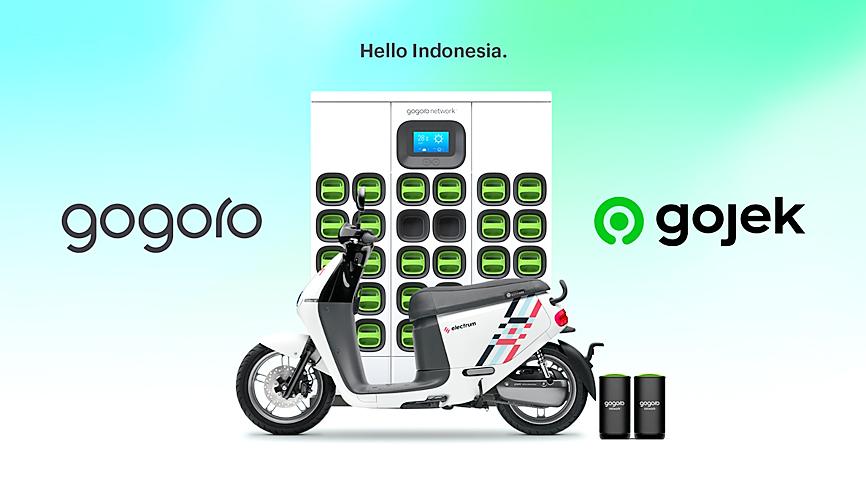Indonesian ride-hailing platform Gojek on Tuesday said that it would launch a pilot program with Gogoro Inc (睿能創意), allowing its drivers to use electric scooters made by the Taiwanese company.
The program would be launched in Jakarta with 250 scooters and four battery swap stations developed by Gogoro, Gojek said in a statement, without specifying a timeline.
Gojek chief transportation officer Raditya Wibowo said that Gojek and Gogoro would lease scooters to riders for a fee that would cover the cost of swapping batteries, the Nikkei Asia reported.

Photo courtesy of Gojek via CNA
The two companies aim to “scale up the pilot to 5,000 scooters and more battery swap stations in the future,” the statement said.
The initiative is part of Gojek’s efforts to reduce its carbon footprint, with the goal of achieving net-zero emissions by 2030, it said.
“The partnership between Gojek and Gogoro brings together two like-minded companies that are dedicated to making smart electric transportation the norm throughout Indonesia,” Gojek cofounder and CEO Kevin Aluwi said in the statement.
“Such an ambition can only be achieved if multiple stakeholders work together, so partnerships like this are essential if we are to meet our goals to reimagine intra-city transport,” he added.
Gogoro founder and CEO Horace Luke (陸學森) said in the statement that the partnership would help transform “our urban transportation into a new generation of smart and sustainable electric two-wheel vehicles that are accessible.”
The partnership was made public less than two months after Gojek parent GoTo Group announced that it would be investing in Gogoro’s private investment in public equity.
The financing was provided in connection with Gogoro’s plan to list on the NASDAQ Composite in the first quarter of next year via a merger with Poema Global Holdings Corp, a special purpose acquisition company, Gogoro said in September.

SEMICONDUCTORS: The German laser and plasma generator company will expand its local services as its specialized offerings support Taiwan’s semiconductor industries Trumpf SE + Co KG, a global leader in supplying laser technology and plasma generators used in chip production, is expanding its investments in Taiwan in an effort to deeply integrate into the global semiconductor supply chain in the pursuit of growth. The company, headquartered in Ditzingen, Germany, has invested significantly in a newly inaugurated regional technical center for plasma generators in Taoyuan, its latest expansion in Taiwan after being engaged in various industries for more than 25 years. The center, the first of its kind Trumpf built outside Germany, aims to serve customers from Taiwan, Japan, Southeast Asia and South Korea,

Gasoline and diesel prices at domestic fuel stations are to fall NT$0.2 per liter this week, down for a second consecutive week, CPC Corp, Taiwan (台灣中油) and Formosa Petrochemical Corp (台塑石化) announced yesterday. Effective today, gasoline prices at CPC and Formosa stations are to drop to NT$26.4, NT$27.9 and NT$29.9 per liter for 92, 95 and 98-octane unleaded gasoline respectively, the companies said in separate statements. The price of premium diesel is to fall to NT$24.8 per liter at CPC stations and NT$24.6 at Formosa pumps, they said. The price adjustments came even as international crude oil prices rose last week, as traders

Taiwan Semiconductor Manufacturing Co (TSMC, 台積電), which supplies advanced chips to Nvidia Corp and Apple Inc, yesterday reported NT$1.046 trillion (US$33.1 billion) in revenue for last quarter, driven by constantly strong demand for artificial intelligence (AI) chips, falling in the upper end of its forecast. Based on TSMC’s financial guidance, revenue would expand about 22 percent sequentially to the range from US$32.2 billion to US$33.4 billion during the final quarter of 2024, it told investors in October last year. Last year in total, revenue jumped 31.61 percent to NT$3.81 trillion, compared with NT$2.89 trillion generated in the year before, according to

PRECEDENTED TIMES: In news that surely does not shock, AI and tech exports drove a banner for exports last year as Taiwan’s economic growth experienced a flood tide Taiwan’s exports delivered a blockbuster finish to last year with last month’s shipments rising at the second-highest pace on record as demand for artificial intelligence (AI) hardware and advanced computing remained strong, the Ministry of Finance said yesterday. Exports surged 43.4 percent from a year earlier to US$62.48 billion last month, extending growth to 26 consecutive months. Imports climbed 14.9 percent to US$43.04 billion, the second-highest monthly level historically, resulting in a trade surplus of US$19.43 billion — more than double that of the year before. Department of Statistics Director-General Beatrice Tsai (蔡美娜) described the performance as “surprisingly outstanding,” forecasting export growth